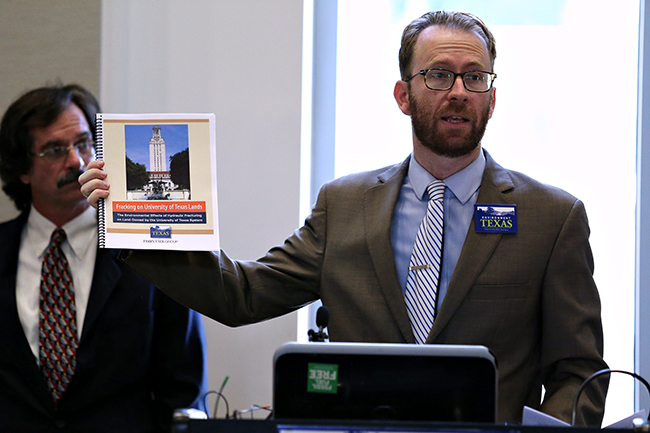Environment Texas issued a report Sept. 8 that advocates for the end of hydraulic fracturing on University Lands. Accepting this recommendation would prove disastrous for the University system and the Texas economy.
Hydraulic fracturing is a widely used process where millions of gallons of water, sand and chemicals are pumped underground to break apart the rock and release gas and oil. Groups such as Environment Texas are worried that the chemicals used in fracturing may threaten the environment and people. Their concerns, however, have not manifested themselves in the long history of hydraulic fracturing.
Ernest Smith, law professor and the Rex G. Baker Centennial Chair in Natural Resources Law, wrote about the positive impact hydraulic fracturing has made in the oil and gas industries.
“Hydraulic fracturing has enormously increased our production of oil and gas by allowing the extraction of hydrocarbons from previously impermeable strata, such as shales and tar sand,” Smith said.
Increase in production has occurred all around the world, including on University Lands.
Oil and gas leases from University Lands brought in more than $1.1 billion in just the 2014 fiscal year, according to Alyssa Ray, marketing and corporate strategy analyst for University Lands. In comparison, tuition from more than 50,000 students only amounted to $589 million for UT-Austin in 2011.
According to Ray, approximately 95 percent of oil and gas leases on University Lands involves the use of hydraulic fracturing. Thus, the result of Environment Texas’s advocacy would be more than just the end of hydraulic fracturing on University Lands, but the complete elimination of a crucial revenue source that supports higher education in Texas.
Railroad Commissioner Christi Craddick said although Environment Texas claims that hydraulic fracturing is so dangerous to the environment and human health that it should not occur anywhere, history does not support this claim.
“For more than 60 years, hydraulic fracturing has been used safely and successfully in over 1 million wells around the world, retrieving more than 7 billion barrels of oil and 600 trillion cubic feet of natural gas,” Craddick said.
In addition to the fact that hydraulic fracturing has been safely regulated for decades, there are legal remedies available for any potential harm, according to Smith.
Smith added that the alternative to hydraulic fracturing has been at times a lot worse.
“Critics of hydraulic fracturing often forget that traditional vertical drilling has also on occasion been done badly and caused pollution and other problems,” Smith said. “In fact, what may have been our worst environmental disaster resulted from British Petroleum’s vertical well blowout in the Gulf of Mexico.”
When we look at the revenue the University system derives from hydraulic fracturing, as well as the fact that it has been safely regulated, there is no good reason to prohibit it. All UT students benefit from hydraulic fracturing, so instead of stigmatizing it, we should be promoting it.
Hung is a second year law student from Brownsville.





















